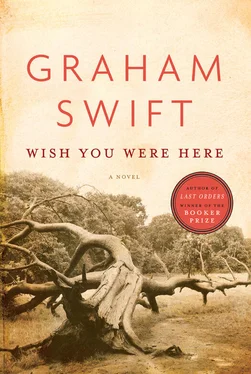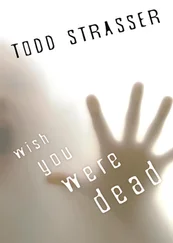That Corporal Luxton was never married.
‘No,’ Jack said, though he wouldn’t have known.
Had no children?
‘No,’ Jack said again, though he might have said, ‘Not that I know of.’
Or other dependants?
‘No,’ Jack said.
Parents?
It seemed to Jack that Major Richards had somehow delayed this question and that he might have done so in some knowing or meaningful way. That it might even be a trick question.
‘Dead,’ Jack had said. It was surely the correct and the quickest answer, but the word came oddly and echoingly from his lips, as if Vera and Michael might have died, too, in an armoured vehicle in Iraq.
‘There are no other relatives,’ Major Richards had then asked, ‘or persons close to Corporal Luxton whom you feel should be informed — I mean, officially informed, other than by yourself?’
‘No,’ Jack had said.
‘You are, in fact, the only living relative?’
‘Yes,’ Jack said, huskily, as if this might be another trick question, an even trickier question. He felt quite clearly now that he was under suspicion, if not under interrogation or on trial. So he was surprised when Major Richards suddenly said, using words he’d used before, but looking at him directly, in a different, softer way, ‘Let me offer you my personal condolences.’ He said it as if he, Major Richards, might have suddenly become a relative of the kind just denied, some sort of temporary father, and might have wished even to reach out and grasp Jack’s arm, so conveying that he understood that Jack was of the same stuff as the dead man being referred to, that he, Jack, and Tom were interchangeable. The Luxton brothers.
And Jack would never forget it. As he’d never forget that moment, looking from this window, when after the black saloon had stopped in the turning-space — the same turning-space that is now, beneath him, a lacework of ruffled puddles — he’d had the impossible thought that this figure in a uniform might be Tom.
Jack had felt himself starting to tremble again, under Major Richards’s gaze, as he’d done under Ellie’s gaze when they’d both first read the letter, and he’d started to want Major Richards to leave.
But Major Richards, now handing Jack a number of papers from his wallet, which were Jack’s copies to keep, had begun to explain that ‘because of the circumstances on the ground’ it was not possible to say as yet exactly when Corporal Luxton would be repatriated, but that it would be soon and that Jack would be kept closely informed. There would be a ceremony, of course, and all due assistance would subsequently be given, following the coroner’s release, in whatever funeral arrangements might be decided upon. Meanwhile, Jack shouldn’t hesitate to call at any time.
This was adding little to what had been said in the letter, and Jack was able to wonder, as Major Richards spoke, whether the unspecified delay and the word ‘circumstances’ and that strange phrase ‘on the ground’ (where else did circumstances happen?) might all be to do with the fact that there was no body really, or not in the usual sense of that word, or that the manner of Corporal Luxton’s death, and his comrades’, might not have been so instant after all. That the ‘incident’—that word had been used at some point — required the army’s own careful investigation. No one yet had used the word ‘body’.
But mainly Jack was trying to control the trembling of his own body.
Perhaps Major Richards saw this. He saw anyway (and he was not unpractised in this observation) that this visit, though there were other matters still to be dealt with, shouldn’t be extended very much further. He’d brought with him, for example, just in case, copies of recent photographs of Corporal Luxton, but he quickly calculated that this wouldn’t be the moment to produce them from his wallet. The principal purpose of his visit, that it should simply have been made, was fulfilled. The battalion had been represented in person and in uniform. This, Major Richards knew, was, among his several duties, the most important and most symbolic, and often the most difficult. But Major Richards was only too aware that soldiers had to do far tougher things.
It was now very unlikely that Major Richards, who quite frequently regretted the course of his career and the fact that he was not by now a colonel, would be called upon to do those far tougher things. And, of course, demanding as it was, being the messenger was far easier than being the receiver. He made conscious efforts to remind himself of this.
On a number of occasions now — and recently these occasions had intensified — Major Richards had been required to announce the actual news in person himself. Of a death (not so often, thank goodness), of a wounding or hospitalisation. Since, with the army’s increasing tendency to merge regiments, his duties effectively operated at brigade level (though he still thought of himself as ‘First Battalion’) and since he’d been deemed good at them, he was not inexperienced. There could be a wife, small children. Or just parents, brothers, sisters. The average age of a soldier meant that his family might very often still all be in one place. This could be both convenient and not. You might walk in on some cluttered, ordinary domestic scene. Everyday havoc. They would always look guilty and apologise for the mess.
He’d taught himself always to look them directly in the eye. Of course, it helped you, but didn’t help them, that they invariably guessed why you were there, as soon as they saw you in your cap. They often even said the words for you: the worst words — which he might be able to correct. Not killed, no. But if it was the worst, or even not (not killed, no, just paralysed) then the reaction could go any way, any old way at all. If, say, it was a young mother and two toddlers. They could explode straight away, or later. Sometimes they could tell you, and it was an order you couldn’t disobey, to make a swift exit. You had to be ready and alert.
It gave Major Richards little satisfaction that he’d acquired the tactical if hardly military skill of knowing when to beat a retreat. Having sat in Lookout Cottage for barely half an hour and having drunk the statutory (but decent) cup of tea, he sensed the need to exercise this ability once again.
Major Richards had never been in Iraq or Afghanistan or indeed in any place where, at the time, actual explosions had occurred and bodies been fragmented. He’d missed the Falklands, as a junior officer — which, for a while, had rankled. Even his tours in Northern Ireland had been quiet. But he had, in recent months, been an intimate witness to some immediate consequences of what was happening in Iraq and Afghanistan. He had, as it were, been present at several scenes of devastation, enough to know that such scenes were proliferating and increasingly pockmarking the land (though they were as nothing, he understood, to the frequency of such scenes in Iraq or Afghanistan). Enough to give him a curious sense of the country in which he dwelt and to which he owed a soldier’s allegiance.
Mostly he did what he did by a process of becoming accustomed to it, if you could ever be, and by the application of instinct. He couldn’t say, as a soldier in Iraq might say, that he was trained. Often he felt like a civilian in uniform, a pretend soldier. As to the rights and wrongs, the whys and wherefores, of the operations in the Middle East, he couldn’t speak, he couldn’t comment, even when (though it was surprisingly rare, one of the less-encountered complications) they demanded that you did.
But this case — Corporal Luxton — was really very simple. Just one living relative, as he’d now confirmed. That had its peculiar sadness and bleakness perhaps, but there would be no further family network (it was a sort of comfort) to trouble, no further connections running like underground wires for further domestic detonations to occur. Just one relative and a wife. And — seeing as they’d had time already to absorb the basic news — there’d been no distressing outbursts. None of the howls or moans or terrifying speechlessness he’d sometimes known.
Читать дальше








![Питер Джеймс - Wish You Were Dead [story]](/books/430350/piter-dzhejms-wish-you-were-dead-story-thumb.webp)



